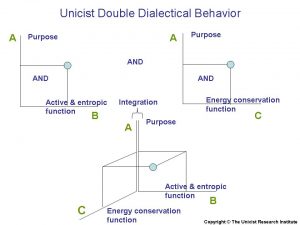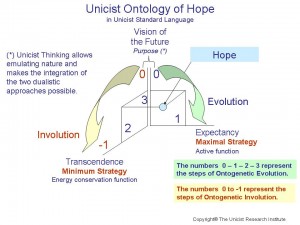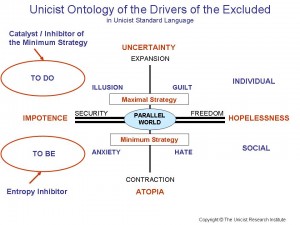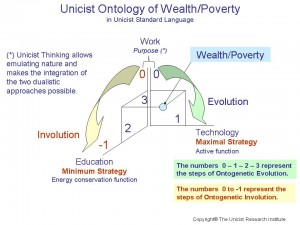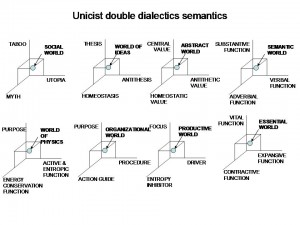Unicist objects are adapted systems designed to influence the evolution of other (wider) adapted systems. Individual, business and social growth are paradigmatic adapted systems where unicist objects can be installed to drive or accelerate growth.
The knowledge of the ontology of a specific reality is necessary in order to build an object to influence it. This abstract is a description of the methods individuals need to use to apprehend the ontology of an adaptive system.
Introduction
Every individual has his natural type of logical thinking and strategic thinking. This defines the type of problems s/he can deal with.
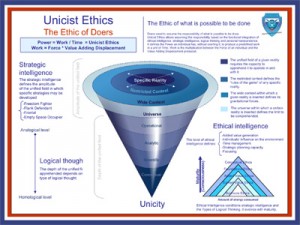
https://www.unicist-school.org/theoryofevolution/wp-content/uploads/2011/05/unicist_ethics_en.pdf
Everyone’s responsibility is making use of what one has to make things happen.
The maturity of knowledge depends on the hunger, responsibility and will of individuals and the prices they accept to pay to achieve it.
Apprehension of ontological structures
The objective of this work is to provide a guide to apprehend the ontological structure of a specific reality when the generic ontological algorithm already as been discovered and developed.
To discover ontologies and develop ontological algorithms you can find the Unicist Standard at:
The Unicist Standard for the Ontological R&D of Adaptive Systems:
http://www.unicist.org/deb_ustdrd.php
The Unicist Standard to Research the Ontology of Human Adaptive Systems:
http://www.unicist.org/deb_ustdas.php
 “Concept” is the plain language name given for an ontological structure and “fundamentals” is the name given to the elements that integrate it.
“Concept” is the plain language name given for an ontological structure and “fundamentals” is the name given to the elements that integrate it.
Sound knowledge and maturity are needed to approach an ontological structure.
Maturity implies that individuals are focused on adding value and profiting from its counterpart in a specific reality.
Therefore we will be focusing on how individuals, having different types of logical thinking, can apprehend an ontological structure.
It has to be said that the first step to approach a new field is to recognize it. To do so individuals compare what they “see” with a preconcept they have. That is what we have named “analogical thinking” meaning that the individual projects on the external reality a preconcept s/he has. This projection stagnates if individuals need to confirm their beliefs or needs.
If individuals have the inner freedom to introject a different external reality the thinking process begins; if not, individuals approach reality with their stagnated survivor ethics.
Apprehending unicist ontologies
We will be following the steps of approaching concepts starting with the operational approach.
Apprehending ontologies with operational thinking
It is a way to adapt to reality based on its operational aspects.
The use of objective scientific tools such as statistics, neural networks, genetic algorithms, etc allows finding the hypothesis of the concept of a specific reality. The scientifically validated results provide a hypothesis of the concept that underlies the observable facts and actions.
As it is based on the research of effects it is needed to be confirmed to avoid fallacious conclusions.
This knowledge can be used after statistically valid pilot tests have been done. It is functional to all those fields of action where secure knowledge is unnecessary.
Apprehending ontologies with analytical thinking
To approach reality with analytical thinking requires knowing the idea of the concept.
Analytical thinking implies analyzing the hypothetical idea of a concept in order to find its structure and make the logical validation of it. Unicist ontological analysis has to be used to make this validation.
Analytical thinking provides the static valid ontological structure to be used. When it is not based on operational knowledge it provides the hypothetical ontological structure of a reality following the rules of the ontogenetic intelligence of nature.
This knowledge allows adjusting the operational knowledge and providing an approach to the ontological algorithms to deal with a specific reality. It allows confirming the hypothesis of the concept defined at the operational level.
Apprehending ontologies with systemic (scientific) thinking
To approach reality with systemic thinking the dynamic of a concept has to be known. This knowledge can have been empirically built or can be based on following the steps that started at a previous thinking level.
The next step for those who have a natural systemic approach to reality is the operational confirmation of its dynamic.
Systemic thinking requires designing tests that allow confirming the hypothetical dynamic that has been defined. It provides a valid knowledge for all those fields that can be managed based on cause-effect relationships. This implies that it can be used in the fields where a real influence on reality can be exerted.
Apprehending ontologies with conceptual thinking
Conceptual thinking allows apprehending a specific reality as a unified field. It is based on confirming the idea of a concept based having experienced it in an adapted way.
Conceptual thinking allows using experiences in homologous fields as valid experiences to develop solutions with added value.
The use of conceptual thinking is the final step of the apprehension of an ontological structure.
Natural conceptual thinkers have to confirm the idea of a concept based on unicist reflection and the use of destructive and non-destructive pilot tests.
Conceptual thinking provides the solutions to deal with complex adaptive systems in which the boundaries are open. It provides secure knowledge of the possibilities of actions and the probabilities of success.
Conclusion
Unicist thinking is the integration of these four types of logical thinking processes. It allows emulating the ontogenetic intelligence of nature to apprehend the ontology of evolution in order to build strategies that allow using unicist objects to drive and accelerate evolution in specific fields.
To build objects, whatever their type, requires being able to apprehend the ontology of the specific reality where they need to be installed.
This requires having achieved a mature knowledge and relationship with that reality in order to be able to focus on adding value and benefiting from the counterpart.
Access or request a Unicist Tweetinar on this subject at:
http://www.academic.unicist.org/unicist_tweetinars.shtml
Peter Belohlavek
NOTE: The Unicist Research Institute is the major research organization in the world in its specialty based on more than 3,500 researches, developed since 1976 until September 2010, in complexity science applied to individual, institutional and social evolution. The applicative researches are based on the discovery of the Ontogenetic Intelligence of Nature and the consequent Unicist Ontology of Evolution.
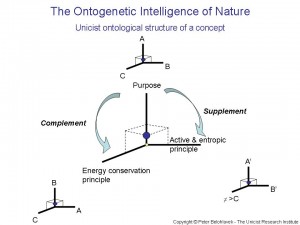 These ontogenetic maps are timeless meaning that they are valid as long as the function they represent exists.
These ontogenetic maps are timeless meaning that they are valid as long as the function they represent exists.